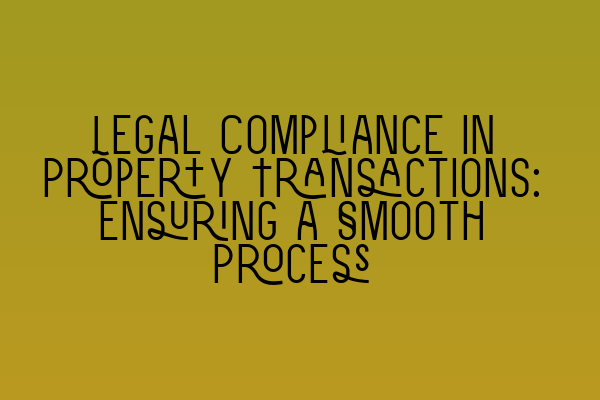Legal Compliance in Property Transactions: Ensuring a Smooth Process
Property transactions can be complex and time-consuming, with numerous legal requirements and compliance issues to consider. Whether you are buying or selling a property, it is crucial to ensure that you adhere to the relevant laws and regulations to avoid any potential complications or legal disputes down the line. In this article, we will discuss the importance of legal compliance in property transactions and provide some key points to keep in mind throughout the process.
Understanding the Legal Framework
Before diving into the specifics of legal compliance, it is essential to have a good understanding of the legal framework surrounding property transactions. The laws governing these transactions can vary depending on the jurisdiction, so it is crucial to work with a solicitor who specializes in property law and land law. They will be well-versed in the local regulations and can guide you through the process while ensuring compliance.
Additionally, being familiar with the legal framework will help you identify potential issues and minimize the risk of legal complications. It is always better to be proactive and address any concerns early on rather than facing legal challenges later.
Key Legal Compliance Considerations
When it comes to legal compliance in property transactions, there are several key considerations to keep in mind:
- Contracts and Documentation: A property transaction typically involves numerous legal documents, such as contracts, deeds, and title deeds. It is crucial to ensure that all the necessary documents are drafted accurately and in compliance with the relevant laws. Working with an experienced solicitor will help you navigate the complexities of documentation and ensure that everything is in order.
- Searches and Due Diligence: Before purchasing a property, it is essential to conduct thorough searches and due diligence to uncover any potential issues or restrictions. This may include searches for planning permission, land registry checks, environmental searches, and more. By conducting these searches, you can identify any potential risks or liabilities associated with the property and make an informed decision.
- Compliance with Planning and Building Regulations: When buying or selling a property, compliance with planning and building regulations is of utmost importance. It is essential to ensure that any alterations or extensions to the property have the necessary planning permission and comply with building regulations. Failure to comply with these regulations can lead to legal issues and potential fines.
- Financial Compliance: Property transactions often involve significant financial considerations, such as mortgages, loans, and payments. It is crucial to ensure that all financial aspects of the transaction comply with the applicable laws and regulations. This includes verifying the legitimacy of mortgage lenders, complying with anti-money laundering regulations, and adhering to tax requirements.
- Environmental Considerations: Environmental regulations play a significant role in property transactions, especially when dealing with contaminated land or properties in environmentally sensitive areas. It is essential to conduct environmental searches and assessments to identify any potential risks or liabilities. Additionally, compliance with environmental regulations will be crucial during the development or renovation of a property.
Working with a Solicitor
Given the complexities and legal intricacies involved in property transactions, it is highly recommended to work with a solicitor specializing in property law and land law. A solicitor with expertise in this field will ensure that you remain compliant throughout the process and help you navigate any legal issues that may arise.
They can assist with drafting and reviewing contracts and documentation, conducting thorough searches and due diligence, ensuring compliance with planning and building regulations, handling financial aspects, and addressing any environmental considerations.
By working with a solicitor, you can have peace of mind knowing that your property transaction is being handled by a legal professional who understands the complexities of property law and is dedicated to ensuring legal compliance.
Conclusion
Legal compliance is crucial in property transactions to ensure a smooth and problem-free process. By understanding the legal framework, considering key compliance requirements, and working with a knowledgeable solicitor, you can minimize the risk of legal complications and navigate the complexities of property transactions with confidence.
If you are preparing for the SQE exam, we also offer SQE 1 Practice Exam Questions and SQE 1 Practice Mocks FLK1 FLK2. We also provide SQE 2 Preparation Courses and SQE 1 Preparation Courses to help you succeed in your legal career. Don’t forget to check out SRA SQE Exam Dates to stay updated on important deadlines.
